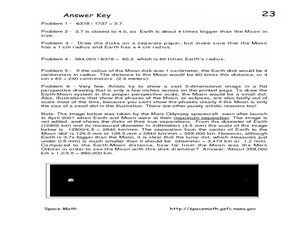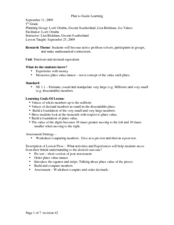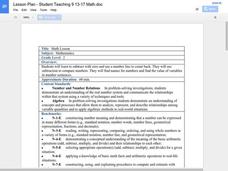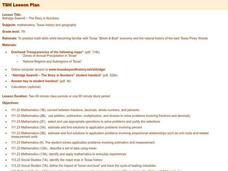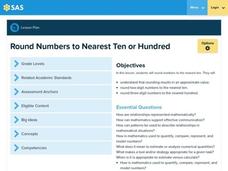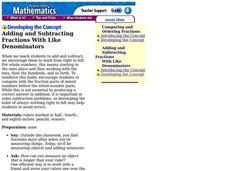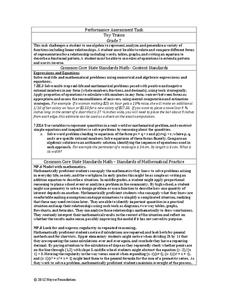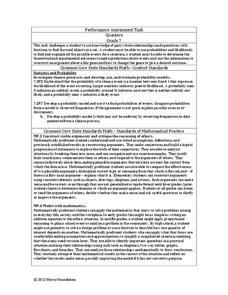Curated OER
Study Buddies: Adding and Subtracting Decimals
In this math worksheet, young scholars will work with a coach to add and subtract numbers with decimals to the hundredths. Students will follow a step-by-step process and notes are provided for the coach.
Curated OER
The Earth and Moon to Scale
In this Earth and Moon worksheet, students find the ratio of the Earth's radius to the Moon's radius, they compare the diameter of the Earth and Moon, they create paper models to scale of the Earth and Moon and they compare Earth-Moon...
Curated OER
Hearing Handicap
Students examine the effects of hearing loss. In this lesson on physical disabilities, students survey five older adults on hearing impairments. Students pool their data and compare their results with the results from other studies about...
Curated OER
How Can You Measure This?
Third graders work in small groups to complete a number of investigations in which they have to use measurement. They determine the fractional part of the newspaper that is used for news, sports, etc. They compare their height to their...
Curated OER
Cartoon Fractions
Students explore mathematics by viewing cartoons. In this math functions lesson, students read several "Peanut" cartoons on their worksheets as they solve fraction problems and compare them to the comic strip. Students utilize addition,...
Curated OER
Going the Distance
Students experiment in small groups to answer the question, "Is there a relationship between ramps and speed?" They apply a formula to calculate the speed of the cars used in the experiment, complete the associate lab report, and...
Curated OER
Measuring Inches
First graders measure the length of pipe cleaners to form worms using rulers to focus on inches. They record their results and graph the measurement of each pipe cleaner. They measure their pipe cleaner "worms" in various colors and...
Curated OER
Finding the Area of Regular Polygons
Students analyze relationship between the increase in polygons sides and a circle. In this geometry lesson, students relate the size of the central angle of a polygon, to a circle. They compare the formula for the area of a polygon and a...
Curated OER
Fractions and Decimal Equivalents: Fifth Grade
Sometimes a skeleton is all you get. This lesson outline provides teachers with a basic lesson flow. Pupils will pre-test, order place value names, use manipulatives, and build and compare numbers. How this is to be done is not...
Curated OER
Number Line Math
Second graders use a number line to practice subtraction. In this subtraction lesson, 2nd graders use a number line to count backwards. Students participate in mad math activities and solve problems.
Curated OER
Comparing Candy Bars
Eighth graders identify that a ratio is a comparison of two numbers and that a proportion is an equation that equates two ratios. They identify the extremes and means of proportions, as well as the product of the extremes equals the...
Curated OER
Aldridge Sawmill - The Story in Numbers
Seventh graders practice math skills while becoming familiar with Texas' "Boom & Bust" economy and the natural history of the east Texas Piney Woods. They utilize worksheets and websites imbedded in this plan.
Pennsylvania Department of Education
Round Numbers to Nearest Ten or Hundred
Third graders review telling time. For this lesson on telling time, 3rd graders discuss various items that show length of time, including clocks, calendars and sand timers. Students review and practice what they already know about...
Curated OER
Comparing and Ordering Fractions
Third graders create fractions from concrete materials, then use paper fractions.
Curated OER
Adding and Subtracting Fractions with Like Denominators
Students add or subtract fraction parts of mixed numbers before adding or subtracting the whole number parts. In this fractions lesson, students learn to use a ruler to help them add and subtract fractions with like denominators.
Curated OER
Pizza, Pizza
Fourth graders investigate the concept of fractions. A pizza is used as a metaphor and example of practice for students. They use the appropriate methods of dividing numbers from a whole and into the fractional parts. Then students...
Curated OER
Number Sense and Numeration: Square Roots
In this square roots learning exercise, 8th graders solve 14 different types of problems to include determining the square root of a number of problems, determining the area of a rectangle and the length of a side of a square with the...
EngageNY
Solving Percent Problems
Don't discount how much your pupils understand percents! The 27th instructional activity in a series of 29 presents a problem to find the cost of a discounted outfit. Small groups determine either the original price or the discount...
Virginia Department of Education
Similar Triangles
Pupils work in pairs to investigate what it takes to prove that two triangles are similar. They work through various shortcuts to find which are enough to show a similarity relationship between the triangles. Small groups work with the...
Curated OER
Addition and Subtraction of Fractions
Students demonstrate how to solve addition and subtraction of fractions. In this fractions lesson, students use folded paper to shade in fractional parts and identify the sum of the parts shaded.
Noyce Foundation
Toy Trains
Scholars identify and continue the numerical pattern for the number of wheels on a train. Using the established pattern and its inverse, they determine whether a number of wheels is possible. Pupils finish by developing an algebraic...
Noyce Foundation
Sewing
Sew up your unit on operations with decimals using this assessment task. Young mathematicians use given rules to determine the amount of fabric they need to sew a pair of pants. They must also fill in a partially complete bill for...
Noyce Foundation
Counters
For some, probability is a losing proposition. The assessment item requires an understanding of fraction operations, probability, and fair games. Pupils determine the fractional portions of an event. They continue to determine whether...
Virginia Department of Education
Constructions
Pupils learn the steps for basic constructions using a straightedge, a compass, and a pencil. Pairs develop the skills to copy a segment and an angle, bisect a segment and an angle, and construct parallel and perpendicular lines.



